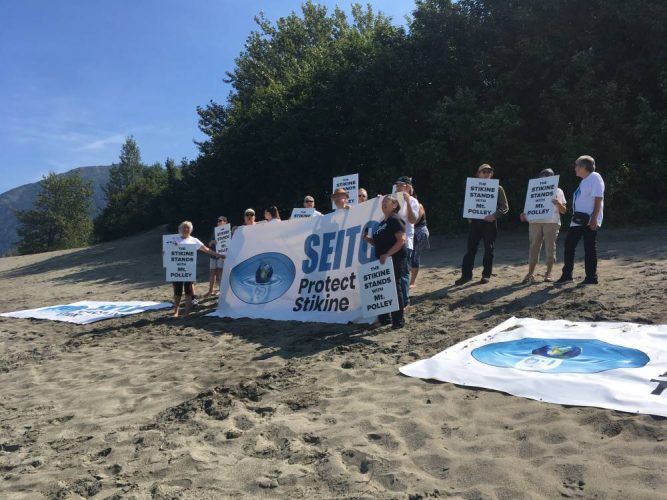
A tribal group held a rally on the Stikine River over the weekend to advocate for stronger oversight of transboundary mining. The event marks five years since the Mount Polley Mine disaster in British Columbia in 2014.
About 30 people gathered at a sandy beach up the Stikine River about 15 miles north of Wrangell Island. They held signs saying protect the Unuk, Taku and Stikine — three transboundary rivers that flow from B.C. to Southeast Alaska.
Native women led this event, and their message was clear: Ingenious folks are the original stewards of this land. So they deserve a seat at regulatory discussions on mining near these rivers.
“That’s why I rattled and sang all the way up here, praying to give me help from our ancestors to stand up and fight,” said Sue Stevens, a Tlingit woman from the Naanya.aayí Clan. “We are not going to let the mines claim this river.”
Sunday August 4th marked exactly five years since the Mount Polley Mine disaster in British Columbia. The mine’s tailing dam breached, sending millions of gallons of mining waste into the Cariboo River and other waters. Operations at the mine halted earlier this year; owner Imperial metals cited low copper prices for its shuttering.
The five-year anniversary was also the final deadline for Canada’s federal government to penalize Imperial Metals under the Fisheries Act.
B.C.’s provincial government had earlier declined to prosecute under its own environmental and mining laws.
There are fears that a Mount Polley-like disaster could devastate Southeast Alaska’s ecology — including its salmon fisheries.
Tis Peterman is the Wrangell rep for the Southeast Alaska Indigenous Transboundary Commission. She recently met with members of the International Joint Commission – a U.S.-Canadian treaty organization that helps settle transboundary disputes over waterways.
“They don’t have the legal means to do any regulations,” Peterman said. “But it’s mainly they can bring the issue to a table, and we’ve been asking for that since 2014.”
Peterman says this was the group’s first meeting with the IJC. She says the meeting lasted two hours.
“At times it got pretty passionate, but they said ‘we’re just here to learn’,” she said.
Peterman says her group wrote to the governor asking for a tribal representative at the bilateral meeting in Ottawa this October. She’s received no response.
Peterman says her group is continuing to engage tribal governments across the border and in other Northwest states to tackle the issue collectively.
The Southeast Alaska Indigenous Transboundary Commission represents 15 tribes in the region. Reps from the Southeast Alaska Regional Health Consortium and Southeast Alaska Environmental Council were also at the rally.













